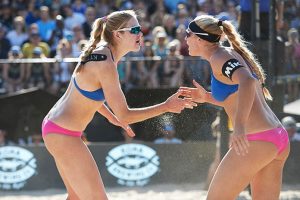SANDCAST Mailbag: Are Tri and Chaim out of the Olympic race? New AVP partnerships?
May 8, 2024
May 4, 2022
HERMOSA BEACH, Calif. — For 15 years, it all seemed predestined, a primordial assignment for the blue-eyed Southern Californian with a swishing blonde ponytail: Sara Hughes was born to play beach volleyball.
She knows this. Has always known it. From the moment she stepped on the sand as an 8-year-old in her first lesson on the north side of the Huntington Beach Pier.
“I remember holding the volleyball after the tryout thinking ‘This is the best sport in the world. This is what I want to do,’†Hughes said on SANDCAST: Beach Volleyball with Tri Bourne and Travis Mewhirter. “Eight years old. Ever since that day, there was no doubt in my mind.â€
The wheels of fate seemed to agree, for with every turn, Hughes and her blossoming career was met with massive success: Misty May-Treanor became a mentor, USA Volleyball tabbed her in their nascent developmental program. At 16, she and Justine Wong-Orantes became the first American team to finish in the top-10 in the U-19 World Championships. At 18, she became the first athlete to declare that she would play exclusively beach volleyball in college. Later that summer, she won a bronze medal at the U-19 World Championships, in Portugal with Kelly Claes.
National championships followed. Record books were rewritten. AVP finals were made; AVP tournaments were won. When May-Treanor mostly retired in 2012, and the U.S. found itself in a strange dearth of elite defenders, it was fitting for Hughes to be tabbed by many as her successor.
And then came the plight.
***
In 1949, Joseph Campbell authored a seminal work, “The Hero with a Thousand Faces,†in which he analyzes the narrative pattern of mythological stories, better known as The Hero’s Journey. These stories, he pontificated, are played out in three acts: departure, initiation, return.
It begins with the call to adventure, in which the hero feels something innate in him or her to accept a seemingly insurmountable challenge. Supernatural aid is discovered. Soon, there is the crossing of the first threshold — the first steps are taken. In other words, there is Sara Hughes, knowing, beyond any semblance of a doubt, that she was born to play beach volleyball; there is Misty May-Treanor, the greatest defender in the history of the game, appearing in her life; there is her transition into the professional world, her first Olympic race set to begin.
Then begins what Campbell calls the Road of Trials.
There are no heroes, in literature or real life, without the Road of Trials. “There is no effort,” as Teddy Roosevelt once said, “without error and shortcoming.” Without those trials, of what interest would be, say, Odysseus and his many bouts with Poseidon? Who is Thor without Loki? Harry Potter without Voldemort? What would Hercules be without his 12 Labors?
Who would Sara Hughes be, years from now, if not for the trial that became 2019-2021?
In 2018, her first year of Olympic qualifying, Hughes’ path looked familiar to those who had followed her career up to that point: She was winning. She and Summer Ross, in their first year as partners, quickly established themselves as the No. 1-ranked team in the United States, with eight top-10 international finishes in their first 10 tournaments, including a win in Moscow, Russia, and bronze in Espinho, Portugal. They played in four AVPs and made four AVP finals.
But after a fifth place finish at the 2019 World Championships, an enormous points boon in the Olympic race, Ross would play just one more international event. She would never step foot on an AVP court again. Chronic back pain derailed Ross’ career and, by extension, any chances of making the Olympic Games. Had she remained healthy, Ross and Hughes would have been the odds-on favorites to qualify for Tokyo alongside April Ross and Alix Klineman.
For two years, as Ross rehabbed and eventually quietly retired, Hughes was left in limbo: It was too late for any of the other potential Olympic teams to break up, yet there were still events to play, both domestically and international. Even when Hughes did land a new partner in Lauren Fendrick, winning their first event, in Cambodia in February of 2020, it would soon be followed by a global pandemic that shut down the world. When beach volleyball resumed on the calendar, there weren’t enough events for Hughes and Fendrick to compete in to even hit the minimum required to qualify for the Olympics.
“It was actually impossible,†Hughes said. “I didn’t get my shot. There’s nothing you can do… It was very tough. It’s been my dream since I was 8 years old. The moment I stepped onto a beach volleyball court I was like ‘This is where I want to be for the rest of my life and this is what I want to do.’ And I was getting there with Summer and what a lot of people might not remember is that we were up there, we were the number one U.S. team for a long time. And then unfortunately something happens that’s out of your control, an injury happens, you can’t go forward, and I was shattered. You fight so hard for something and then it’s gone, but I did nothing wrong. That was the hardest part for me, just emotionally.â€
Hughes’ Road of Trials had begun.

Mykel Jenkins never wishes for anything but gold medals and champagne bottles for his athletes. But the trainer responsible for the longevity of John Hyden, the athleticism of Tri Bourne, the indefatigable fitness levels of Kelley Kolinske and Emily Stockman, knows the value of adversity. He knows the rewards that can be reaped when someone as remarkably gifted as Sara Hughes goes through what he calls “the plight.â€
That’s where you dig into the innermost sections of your soul, where you find out what lays beneath that shiny veneer of records and accolades and wins. That’s where you find the source of what will fuel the remainder of your career.
The plight is where you evolve.
Sara Hughes evolved.
She could have taken time off in those three years in which she was, relatively speaking, partnerless. Relaxed. Recharged. Few would have blamed her.
She did the opposite. There she was, at 29th street in Hermosa Beach, every day, digging balls from Jose Loiola, chasing down shots from Leandro Pinheiro, hitting balls, passing balls, sprinting for balls, diving for balls that no cameras would see, balls for which no fans would applaud, balls for which no points were won. If this was a plight through which Sara Hughes was going, she was going to emerge on the other end a different player, a living bildungsroman.
“You have two options here: you can give up, quit, sulk, why did this happen to me, or you can get better and push it aside, move on, and keep going after what you want, and that’s what I decided to do,†Hughes said. “No matter what happened, I still want this more than anything. I said my peace with it and got back on the volleyball court.
“A lot of those practices was just me and Jose on the court, who was absolutely incredible. And now here we are today, whatever happened in the past is in the past, now I’m just completely moving forward with this great new team, this great new partner, and we got that great finish. You’re right where you’re supposed to be.
“It’s growth, right?â€
It would be difficult to argue that Hughes is anywhere but exactly where she needs to be, with exactly whom she’s playing. Just three tournaments into a partnership with Kolinske, the two have three top-10s and a gold medal at the Itapema Challenge. They are now the No. 2-ranked team in the U.S. — by World Ranking, not AVP ranking — and are qualified for the upcoming World Championships in Rome, Italy.
All of this is new for Hughes — a new coach in Evie Matthews, a new partner in Kolinske, a new trainer in Jenkins, who she says “has been the coolest thing in the entire world. I’m so blessed to be in his gym, working with him. Being able to experience being a part of his team, I’m so grateful. I don’t think I can do anything else the rest of my life. I’m all in with the type of mindset he has and the appreciation he has with the athletes who put in the work. It’s a game-changer, honestly.â€
This is the section of the Hero’s Journey that Campbell labels the resurrection and rebirth, where the hero discovers something new within themselves, when they emerge different, a vastly improved version. It precedes the ending with which anyone who has read a good fable is quite familiar: Ascension.
“I couldn’t fathom stopping playing,†Hughes said. “I still don’t want to quit. There’s no way. I can’t even think about that. I want to be here. I want to play. And I want to be at the top.â€
